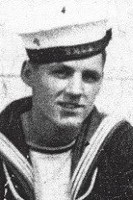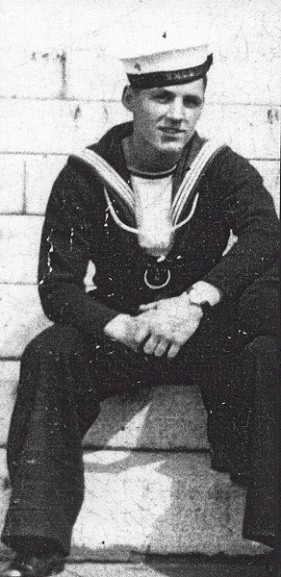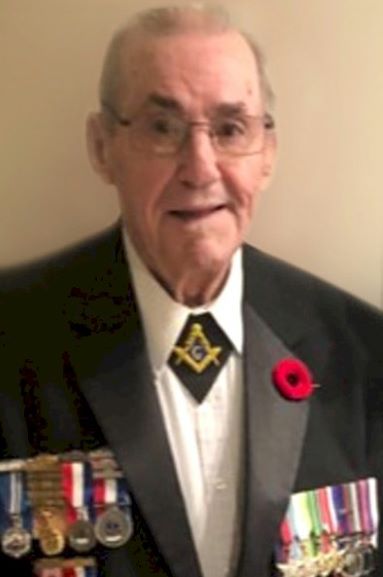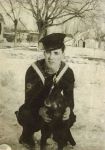|
In memory of those who have Crossed the Bar
SEELEY, Frederick Herbert - A 100th birthday party was planned for this month, but instead, we are having a Celebration of Life.
Time took Dad in December, to join Mom on what would have been her birthday.
He was predeceased by all his siblings, his beloved wife Rosemary, and daughter Dianne. Left to celebrate his very full life are his daughters: Valerie (Ron) McMillan, Debbie (Murdie) McCallum and Laurie (Paul) Mundt and his only son Fred Jr. (Wanda) Seeley. He was blessed with 11 grandchildren and numerous great-grandchildren and great-great-grandchildren.
Dad loved his family, his country, and his social life and friends. He was a proud WWII Veteran, Free Mason, and member of the Church of the Advent, Railway Association, RCNA, Langford Legion and Lifetime Lion and CSRA member.
He travelled the world making many friends and playing his bagpipes. He was full of life, dancing and socializing just a week before his passing.
We miss him but remain comforted by memories.
A private family gathering is planned for this summer. (The Goldstream News Gazette 09 Dec 2023)
Ships served in: HMCS GUYSBOROUGH - 1942 - 1945
(FS001) Fred Seeley on first leave and "Snooky", Jan 1943, Dauphin, MB (FS002) Fred Seeley in hospital after the sinking of HMCS GUYSBOROUGH From "The Lookout" Magazine, March 2005 (FS003) Fred Seeley with partner Gerry Brooks at his 90th Birthday in 2014 (FS004-FS005) Fred Seeley tells his story to a local Saanich newspaper - Nov 2019
Fred Seeley's tells his story .....
I was born and raised in Dauphin, MB. In Dec 1941, I took the train to Winnipeg where I joined the Royal Canadian Navy at HMCS Chippawa - at the age of 17 years and 9 months. I had Grade 10. They told me if I went back to school and completed my Grade 11 that I could become an officer. I told them that I didn't want to become an officer, I wanted to join the Navy and fight Jerries.
After basic training and trades training as an ASDIC (Sonar) operator, I was drafted to HMCS GUYSBOROUGH, a Bangor class minesweeper. I was on GUYSBOROUGH for most of the war; and remember when we towed in a disable freighter and right after, an American sub-chaser. Once we got the American back in port we where given chocolates and cigarettes from their crew.
While we were in England, I met Rosemary, a WREN from Belfast - we were married in England on 02 Nov 1944. When GUYSBOROUGH sailed for the last time, Rosemary was pregnant with our first child.
I was onboard GUYSBOROUGH when she was torpedoed and sunk. When we sailed we could have sailed with a convoy but the Captain chose to sail independently. There were 93 on board GUYSBOROUGH that day - including several passengers - 1 army officer, 1 submarine captain, and 1 or 2 others who were on board for the crossing.
I wasn't on watch at the time but was up in the ASDIC room behind the bridge when the first torpedo hit the stern of the ship. She was settling by the stern, and we launched the whaler and the motor work boat. We were getting ready to abandon ship when the captain order the boats crews back on board. They ship was not sinking and they had sent out an SOS and would be rescued (towed in).
The second torpedo hit almost an hour later. The GUYSBOROUGH had not sunk so the U-boat Captain decided to finish her off. The second torpedo hit starboard side amidships. I was thrown up in the air and knocked unconscious. When I came to, the bridge was empty with the exception of one man who was hanging upside down and unable to free himself. After I cut him down he took off into the ship to get some rum and was never seen again. I jumped over the side - and I believe I was the last man off the ship.
The second torpedo destroyed the whaler and the motor work boat as they were tied along the starboard side and there were only 5 Carley floats were in the water. The Carley floats were life rafts with a capacity of 10 men - there were 90 of us in the water. Four of the floats were lashed together but the 5th had drifted away. About forty of those in the water swam towards the one raft - which probably saved a lot of us that swam to the 4 rafts as more of us were able to climb on them.
There was one man in the water between the ship and the rafts; he was panicking and screaming that he can't swim. As I swam past him to the rafts I grabbed him with my left arm and pulled him with me. After we were rescued, the fellow I pulled to the rafts was heard bragging how calm he was when this all happened. I don't understand how someone could say stuff like that when there were 40 witnesses.
One of the officers, Lt Slade, was a hero. They tried to pull him onto the rafts that were tied together, but he refused until everyone else was saved. We took the belts from our life vests and tied him to the rafts. After few hours, he untied himself and swam away - he was one of those that were lost. Of the 40 or so that swam to the the single Carley float, only 6 survived. The rest became hypothermic and fell asleep and were gone. On our rafts, one young fellow, Robert Robertson was being held up beside the rafts by his school chum. He held him there till the hypothermia got to him. He died in his friends arms.
I spent 6 months in three different hospitals in England. I had a broken collar bone, a fractured arm and a gash over my left eye. When it first happened, the skin had fallen down over my eye and I thought I had lost my eye. I have a photo with the bandage over my eye taken while I was in the hospital. My wife wasn't notified that I had been lost or survived. She eventually went to London and found out I was alive and where I was. Apparently some officer thought she was in Canada.
By the time I got out of the hospital, the war was over. I went to sea one last time on HMCS St. Laurent - when she returned to Canada. Of my 48 months in the Navy, I spent 38 at sea. After I got out of the Navy, I worked for the railway. It was hard work - if we had to dig, we dug with shovels, not with some piece of equipment. I've always worked hard and I never smoked - which I believe is why I've had such a healthy long life. My parents worked hard as well - but it was a different life back then; we had an outhouse and your froze your butt off in winter. I never knew what running water was until I joined the Navy.
Our first child, a daughter, was born in 1945 and is now 70 years old. We had four more children and my youngest is 56. I have grandchildren, great-grandchildren, and a few great-great-grandchildren.
|









